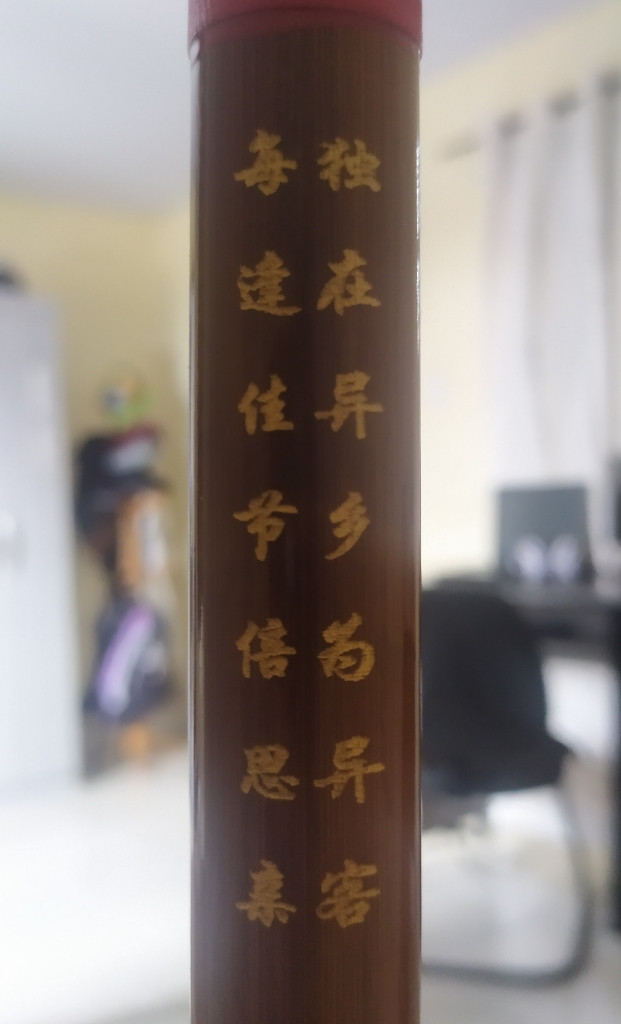I've always been curious to know the translation of this sentence but I've never been able to translate it
3 Answers
So it's a very famous line from a very famous poem:
九月九日忆山东兄弟
【唐】王维
独在异乡为异客,每逢佳节倍思亲。
遥知兄弟登高处,遍插茱萸少一人。
It means: 独自远离家乡难免总有一点凄凉,[Leaving home alone is a little melancholic, so homesick]
每到重阳佳节倍加思念远方的亲人。[When it is ChongYang festival,(which is Sept.9th in the lunar calendar, a very "lucky festival"), I begin to miss my family that lives far away]
(These first two lines above are what is written on your flute)
远远想到兄弟们身佩茱萸登上高处,[From afar, I think about my brothers wearing cornel to higher grounds (I vaguely recall its a tradition in the Chongyang festival to 登高)]
也会因为少我一人而生遗憾之情。 [They will have regrets that I'm not there with them (I won't get into 插茱萸 because that's a long explanation of traditions)]
The poet wrote very poetically and this is not the word by word translation. Generally, the poet is lonely and is home-sick
Hope that helps
Perhaps OP and others may appreciate the two lines better if the words and phrases are translated as verbatim as possible, with necessary prepositions for sentential flow. Pinyin is incorporated for ease of reading.
Here goes:-
Line #1 - 独在异乡为异客 (Dú zài yì xiāng wéi yì kè)
独在 = Alone in...
异乡 = a foreign town...
为 = as a...
异客 = foreigner.
Line #2 - 每逢佳节倍思亲 (Měi féng jiā jié bèi sī qīn)
每逢 = At every...
佳节 = festive season...
倍 = doubly...
思 = miss...
亲 = relatives / loved ones.
-
I guess the reason the poem is placed on a Dizi is because traditionally people carry the handy Dizi around with them when traveling in times when distant journeys were rare, and so in such times when home sickness strikes on these long, lonely journeys, playing and listening to the soft, haunting sound of the Dizi does make one feels a nostalgic connection to one's home town in which the Dizi is manufactured. And so, if OP could play the Dizi when sojourning in a foreign town, country, he / she may get a more qualitative pleasure from the music produced when heard with the poem in mind. Commented Mar 25, 2022 at 4:10
-
2Good to have a word-by-word explanation. One thing about pronunciation: if I am not mistaken, 为 should pronounce wéi (2nd tone) here as opposed to wèi (4th tone).– ALifeCommented Mar 25, 2022 at 5:18
In case too many characters may overwhelm the new contributor, those on the flute are:
独在异乡为异客 (the first line, i.e., the right vertical line, reading from top to bottom)
and
每逢佳节倍思亲(the second line, i.e., the left vertical line).
Also in case the OP is interested in, those characters are simplified Chinese, so the flute should be a modern product, although having these two lines of poem is very appropriate.
